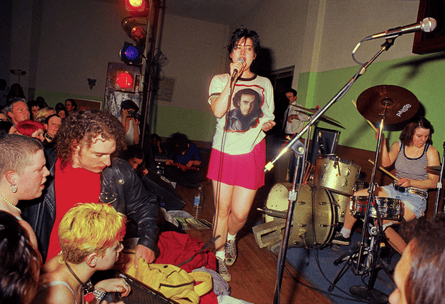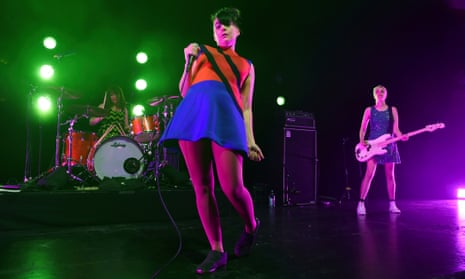Bikini Kill never intended to reunite. “It wasn’t something that crossed my mind as a possibility or anything that I would want to do,” says drummer Tobi Vail. “Going back in time doesn’t make sense to me.” It wasn’t until 2017, two decades after they’d parted ways, that the pioneering riot grrrl band witnessed a model for doing it. They’d been asked to play a song at a New York event in honour of the Raincoats, prompted by a book about the London-based feminist punk group’s self-titled 1979 album. In that room, Vail witnessed a group often erased from the punk canon writing their own history.
“They were telling their story on their own terms,” recalls Vail. “There’s a power in seizing history. To me, that’s what being a band allows you to access. If we see historicisation as an institutional force, let’s be inclusive: let women’s voices in.” After that night, Bikini Kill watched as fans called their brief performance a “reunion”. It “felt right”, says Vail, so they decided to do more shows.
Vail is calling from LA, singer Kathleen Hanna’s adopted home town, where the group have been rehearsing prior to the first leg of their tour in the US. She is firm that this it isn’t just a nostalgia trip. “It doesn’t feel like an irrelevant, punk oldies thing.”
Indeed, it’s hard to tell whether it’s depressing or galvanising that a mission begun three decades ago still feels so relevant. In the wilds of early 90s Olympia, in America’s Pacific Northwest, Bikini Kill’s “revolution girl style now” aimed to radicalise girls and women to take direct action against sexism. The riot grrrl movement, founded by a coterie of like-minded bands and zine-makers nationwide, was about reclaiming a girlhood spoiled by misogyny. Bikini Kill tackled rape culture, female solidarity and the pursuit of pleasure in Hanna’s confrontational sing-song vocals, backed by abrasive, lo-fi playing. At gigs, they famously brought “girls to the front” to provide a sanctuary from the aggression of male-dominated punk shows.
Life in the band was tough. While celebrated by peers such as Kurt Cobain (Hanna wrote “Kurt smells like Teen Spirit” on his bedroom wall, inspiring Nirvana’s biggest hit), they were often abused at shows, with some men turning up specifically to cause trouble. Other feminist punks decried Hanna after the media crowned her the leader of a supposedly non-hierarchical scene. The male-dominated music press frequently mocked the band (“Moronic nag-unto-vomit tantrums over stock school-of-Sabbath riffage,” wrote Rolling Stone of their self-titled 1993 EP) or seemed intentionally to misinterpret them: Hanna was repeatedly and wrongly portrayed as a survivor of incestuous abuse.
“It was extremely sexist and condescending,” says Vail of the coverage. “It’s upsetting now, so imagine processing that at the time. People can’t even hear what you’re saying [as a band] because it’s filtered through these institutions.” The riot grrrl movement encouraged boycotting the media. On the rare occasion that Bikini Kill did speak to the press, it wasn’t to promote their work but, says Vail, “to encourage girls everywhere to start their own bands”. Their success can’t be overstated: it’s impossible to imagine today’s landscape without riot grrrl.

After releasing three albums, Bikini Kill played their last show in Tokyo in 1997. “There were interpersonal conflicts,” says Vail. “We’d done everything we wanted to. It just fizzled out.”
Seven years is no mean feat for a young band under such pressure. Vail agrees. “Getting to the end of your 20s, you’re thinking, ‘What am I going to do next?’” She feels warmly towards their younger selves. “When you’re in a band it becomes like a relationship or a family structure, so you all get into your roles and that can become somewhat dysfunctional. We have different skill sets and it’s a healthier lifestyle now – not like we were always nihilistic and self-destructive, but when you get older you figure out how to live and it’s not such a struggle.”
Still, Vail is frustrated that women are still fighting for what riot grrrls wanted in the 90s. “These same issues still exist,” she says. “Being a woman in public is very intense, whether it’s in the public eye or just walking down the street at night by yourself.”
In some respects, Bikini Kill’s once-underground brand of feminism has gone mainstream: the #MeToo movement echoes conversations that riot grrrl opened up. “Obviously we didn’t transform society,” Vail says. Yet feminism has, in some respects, also been defanged. “Whenever feminism intersects with the mainstream, you have to be a little suspicious about whose voices are not being heard,” says Vail.
She admits the same was true of riot grrrl, a very white, middle-class scene. “I remember being like, ‘Well, anyone can be in a band’, but the truth is not everyone has access to information and resources and leisure time, and those privileges get reproduced over and over again.”
Their legacy – plus nostalgia – means that Bikini Kill are now bigger than in their heyday. The venues are larger, the tickets more expensive, the cultural cachet stronger. “We’re in a different reality,” Vail says of what the band can mean today. “We’re doing it because we want to be a part of this conversation about what feminism is in this moment..”
They want to use music “as a tool for enacting feminist mythology or helping to create a language”. More specifically, Vail wants to replicate what the Raincoats did in New York, meaning more women find the band and understand their history, especially those who didn’t hear them the first time around.
They haven’t decided whether Bikini Kill will make new music. Vail says they are being cautious and making decisions based on what feels appropriate personally and politically. But she knows their old songs have new power in today’s modern climate – the desire to question socialisation in Feels Blind, or that riotous call for female togetherness in cult hit Rebel Girl.
Playing them in the rehearsal space has been “physically emotional”, she says. “I’ll be playing drums and Kathleen’s singing and we’re back in that place again. It’s intense. It’s not that since the early 90s the songs have ceased to have meaning, but everything she’s saying feels like it’s right now.”
